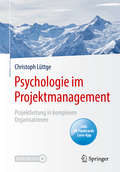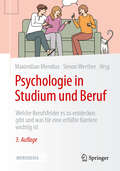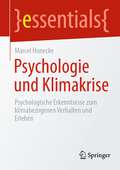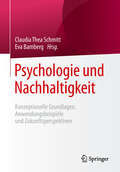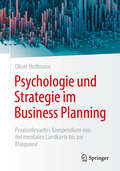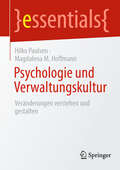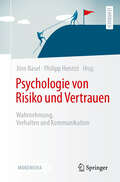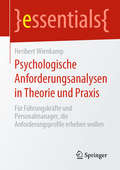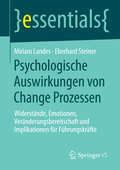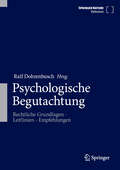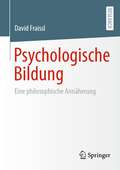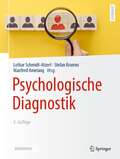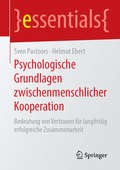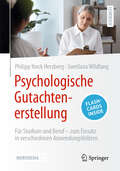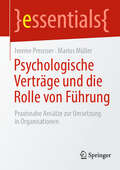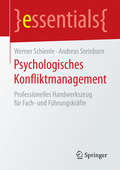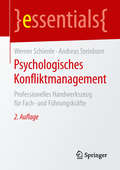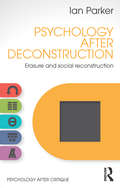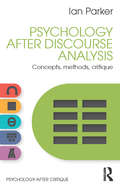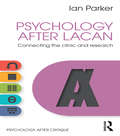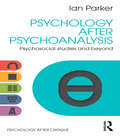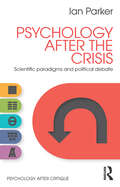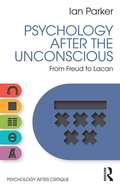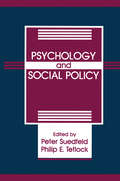- Table View
- List View
Psychologie im Projektmanagement: Projektleitung in komplexen Organisationen
by Christoph LüttgeSie leiten ein komplexes Projekt, wenden SCRUM und agile Managementmethoden an, machen auch sonst alles richtig und trotzdem gibt es Unzufriedenheit unter den Stakeholdern? Dieses Fachbuch über Projektmanagement bietet Ihnen praxistaugliche Lösungen zu Vertrauensbildung und Motivation und führt Sie dabei in einmaliger Weise durch die psychologischen Untiefen von Risiken und Krisen sicher zum Erfolg. Von theoretischen Fundamenten wie der Motivations-, Organisations- und Kommunikationspsychologie wird der Bogen zum unternehmenspolitischen Umfeld gespannt, in dem Sie sich als Projektleitung bewegen. Aus seiner eigenen, über 25-jährigen Projekterfahrung reichert der Autor jedes Thema mit Darstellungen konkreter Managementsituationen aus der Praxis an, in denen Sie sich wiederfinden werden. Fragen und Antworten zum Selbsttest sind über die Flashcard App inkludiert. Ihren persönlichen Code finden Sie im Buch. Zielgruppen: Das Buch wendet sich an Projektleitungen und Führungskräfte, an Neueinsteiger genauso wie an erfahrene Profis, die kontinuierlich ihren Führungsstil weiterentwickeln wollen.
Psychologie in Studium und Beruf: Welche Berufsfelder es zu entdecken gibt und was für eine erfüllte Karriere wichtig ist
by Simon Werther Maximilian MendiusDieses Buch nimmt Sie mit auf eine faszinierende Reise durch die vielfältigen Tätigkeitsfelder von Psycholog:innen. Dabei lernen Sie neben den etablierten Anwendungsgebieten wie klinische Psychologie und Wirtschaftspsychologie auch vermeintlich exotische Arbeitsfelder wie Polizei- oder Verkehrspsychologie oder Data Science kennen. Finden Sie für sich heraus, ob und für welche Tätigkeit in der Psychologie Ihr Herz schlägt und wie Sie diesen Wunsch verwirklichen können. Alle Kapitel sind von erfahrenen Expert:innen aus der Praxis verfasst. Sie vermitteln Ihnen einen sowohl authentischen als auch realistischen Einblick in den jeweiligen Berufsalltag und räumen auf mit gängigen Vorurteilen. Darüber hinaus eröffnen eingeflochtene Interviews mit praktisch tätigen Psycholog:innen und Expert:innen aus der Wissenschaft bereichernde Perspektiven. In dieser Neuauflage von Faszination Psychologie – Berufsfelder und Karrierewege haben wir zudem exklusive Webinhalte ergänzt, wo Sie in spannenden Formaten weitere relevante Einblicke gewinnen können.
Psychologie und Klimakrise: Psychologische Erkenntnisse zum klimabezogenen Verhalten und Erleben (essentials)
by Marcel HuneckeAuf der Grundlage umweltpsychologischer Erkenntnisse werden Ansatzpunkte und Strategien zur Förderung nachhaltigen Verhaltens benannt. Eine sozial-ökologischen Transformation erfordert jedoch nicht nur die Veränderung von spezifischen Verhaltensweisen, sondern umfassende Veränderungen in den bestehenden Lebensstilen. Der Ansatz der psychischen Ressourcen verfolgt dieses Ziel durch die Berücksichtigung des subjektiven Wohlbefindens als zentrale Motivationsquelle für nachhaltiges Verhalten. Hierbei gilt es auch die durch die Klimakrise verursachten Gefühle der Macht- und Hilflosigkeit zu überwinden, um das individuelle und kollektive Engagement für den Klimaschutz zu stärken.
Psychologie und Nachhaltigkeit: Konzeptionelle Grundlagen, Anwendungsbeispiele und Zukunftsperspektiven
by Eva Bamberg Claudia Thea SchmittDieser Sammelband setzt sich zum Ziel, wesentliche Beiträge und Potenziale der Psychologie für (globale) Nachhaltigkeit herauszuarbeiten, innerhalb der psychologischen Disziplin (weiter) für den gesellschaftlichen Nachhaltigkeitsdiskurs zu sensibilisieren und künftige Forschungs- und Anwendungsperspektiven in den interdisziplinären Dialog einzubringen. Die Psychologie als Wissenschaft vom Erleben und Verhalten des Menschen bietet in vielfältiger Weise konzeptionelle sowie empirische Anknüpfungspunkte für den aktuellen Diskurs um nachhaltige Entwicklung – insbesondere im Hinblick auf die Umsetzung der als Agenda 2030 im September 2015 von den UN proklamierten Sustainable Development Goals.
Psychologie und Strategie im Business Planning: Praxisrelevantes Kompendium von der mentalen Landkarte bis zur Blaupause
by Oliver HoffmannEin Business Plan ist weit mehr als nur ein strukturiertes Dokument: Er ist ein mentales Werkzeug, das die Denkweise, Risikobereitschaft und strategische Anpassungsfähigkeit eines Unternehmers reflektiert. Denn erfolgreiches Business Planning erfordert nicht nur eine fundierte Marktanalyse und präzise Finanzplanung, sondern auch ein Verständnis der psychologischen Mechanismen, die unternehmerische Entscheidungen beeinflussen. Business Planning ist nicht nur Strategie, sondern Psychologie. Kognitive Verzerrungen, emotionale Entscheidungsprozesse und unbewusste Annahmen prägen maßgeblich, wie realistisch und umsetzbar ein Plan ist. Ein Business Plan ist eine mentale Landkarte: Er dient nicht nur als wirtschaftliche Prognose, sondern als Orientierungshilfe in einem unsicheren Umfeld. Rationalität vs. Emotionen im Business Planning: Systematische Denkfehler wie Optimismus-Bias oder Verlustaversion beeinflussen, wie Risiken und Chancen eingeschätzt werden. Flexibilität und psychologische Widerstandskraft sind entscheidend: Ein starrer Plan ist wertlos, wenn er nicht die Fähigkeit zur Anpassung in dynamischen Märkten mit einbezieht. Investoren und Partner investieren in Menschen, nicht nur in Zahlen: Eine überzeugende Vision, ein reflektiertes Risikomanagement und ein realistisches Geschäftsmodell sind ausschlaggebend für Vertrauen und Erfolg. Das Buch zeigt, wie Business Planning methodisch funktioniert und wie es bewusst psychologisch optimiert werden kann, um Denkfallen zu vermeiden, bessere Entscheidungen zu treffen und langfristig unternehmerischen Erfolg zu ermöglichen. Die Zielgruppen • Existenzgründer und Start-up-Unternehmer • Unternehmer • Investoren und Business Angels • Manager und Führungskräfte <p s
Psychologie und Verwaltungskultur: Veränderungen verstehen und gestalten (essentials)
by Hilko Paulsen Magdalena M. HoffmannVerwaltungen entwickeln sich kontinuierlich in einem Spannungsfeld aus Bewahren und Verändern weiter. Der Faktor Mensch und die jeweilige Verwaltungskultur spielen dabei eine zentrale Rolle. Wer in Verwaltungen Veränderungsprozesse anstoßen und begleiten möchte, profitiert von psychologischem Wissen über menschliches Erleben und Verhalten und ein Verständnis von der jeweiligen Verwaltungskultur. Dieses essential bietet Modelle zum besseren Verständnis von Veränderungen im Verwaltungsalltag und zudem Ansätze und Methoden zur Gestaltung von Veränderungsprozessen.
Psychologie von Risiko und Vertrauen: Wahrnehmung, Verhalten und Kommunikation
by Philipp Henrizi Jörn BaselPsychologie von Risiko und Vertrauen Unsicherheit und Unplanbarkeit nehmen zu, globale Krisen, Fake News und Skepsis erodieren bestehendes Vertrauen. Zusätzlich wird diese Dynamik durch technologische Entwicklungen befeuert, deren Akzeptanz maßgeblich von einer subjektiven Bewertung der Chancen und Risiken abhängt. Risikokompetenz, Risikomündigkeit oder auch Vertrauensaufbau sind hierbei zentrale Schlagwörter, welche exemplarisch für einen fundierten Umgang mit Risiko und Vertrauen stehen. Dieses Buch bietet Ihnen in 11 Kapiteln eine praxisorientierte Einführung in die Psychologie von Risiko und Vertrauen. Sie vertiefen Ihre Kenntnisse über Risikokommunikation im Krisenfall, den Umgang mit Misstrauen und auch wie es gelingt Vertrauen als entscheidendes Bindeglied zu etablieren, um Innovation und Fortschritt zu ermöglichen.Die didaktisch eingängig strukturierten Inhalte mit Lernzielen und Kontrollfragen stützen sich auf bewährte psychologische und aktuelle wissenschaftliche Erkenntnisse. Vielfältige Praxisbeispiele, wie z.B. von einer Extremsportlerin, einem Flight Safety Officer und einem katholischen Missbrauchsaufklärer, vermitteln einen persönlichen Bezug und zeigen Ihnen, wie vielschichtig sich der Umgang mit Risiko und Vertrauen gestalten kann. Dazu erhalten Sie hilfreiche Zusatzmaterialien über die Begleitwebseite. Kapitel 4 ist unter einer Creative Commons Attribution 4.0 International License über link.springer.com frei verfügbar (Open Access).Zielgruppen Studierende der Wirtschaftspsychologie und anderer Studiengänge im Bereich Wirtschaft, Entscheidungsträger, Führungskräfte und alle, die sich für den Umgang mit Risiko und Vertrauen interessieren.Zu den Herausgebern Prof. Dr. Jörn Basel – Professor für Wirtschaftspsychologie an der Hochschule Luzern (HSLU). Mitglied des First International Network on Trust (FINT). Seine Forschung beschäftigt sich unter anderem damit, wie Organisationen verlorenes Vertrauen wiederaufbauen können. Prof. Dr. Philipp Henrizi – Professor und Programmleiter Governance, Risk and Compliance der Hochschule Luzern (HSLU). Diverse Forschungsprojekte und Publikationen im Bereich Risk Management und Compliance Management. Mitglied im European Risk Research Network (ERRN).
Psychologische Anforderungsanalysen in Theorie und Praxis: Für Führungskräfte und Personalmanager, die Anforderungsprofile erheben wollen (essentials)
by Heribert WienkampPsychologische Anforderungsanalysen zeigen mit ihren Anforderungs- und Qualifikationsprofilen, worauf es zukünftig bei der Arbeit ankommt! Profitieren soll von diesen Informationen, die durch einen Methodenmix aus z. B. Fragebögen und „Expertengesprächen“ vor Ort zuvor zu erheben sind, sowohl die Bewerberauswahl als auch die Schulung des Personals, wie es sich z. B. angesichts neuer strategischer Herausforderungen im Finanzierungsgeschäft einer Bank ergab. Anhand ausgewählter Personalkennzahlen aus der operativen Personalarbeit ist zu prüfen, ob die aktuelle Personalstrategie „noch auf Kurs“ ist.
Psychologische Anforderungsanalysen: Anforderungsprofile für Management, Arbeit und Business
by Heribert WienkampAnforderungsprofile scheinen auf Personalverantwortliche einen magischen Einfluss auszuüben, denn sonst wären sie für strategische Entscheidungen im Personalmanagement nicht so gefragt. Für Sie als potenzieller Nutzer ist entscheidend, weniger nach dem „universell talentierten Mitarbeiter“ zu fahnden, den es im Übrigen so gar nicht gibt, sondern die aktuelle und zukünftige Personalqualität im Unternehmen festzustellen In diesem Buch erhalten Sie einen Überblick über die mit Anforderungsstrukturen korrespondierenden Instrumente des Personalmanagements wie z.B. Förderkonzepte, Seminarangebote oder Tests. Außerdem werden Ihnen psychologische Erkenntnisse über geschäftlich motiviertes Denken und Handeln vermittelt. Dazu kommt, dass die hier vorgestellte psychologische Anforderungsanalyse nicht nur der Personalauslese und der Personalentwicklung in ihren Kernaufgaben von Nutzen sein wird, sondern ebenso neue Wege zur Identifizierung erfolgskritischer Business-Anforderungen aufzeigen kann. Business-Anforderungen sind z.B. in undurchsichtigen Situationen, wo es auf politische Kalküle und taktisches Geschick ankommt, aber auch bei Einführung moderner Managementsysteme und IT-Technologien (inkl. Social Media) allgegenwärtig und nicht wegzudenken. Zielgruppen: Führungskräfte, Personalreferenten und Arbeitsanalytiker und alle diejenigen, die sich mit Personalfragen, Arbeits- und Anforderungsanalysen, und strategischen Managementthemen beschäftigen. Zum Autor: Heribert Wienkamp ist Dipl.-Psychologe, PhD, Betriebswirt (grad.), berufliche Tätigkeit in verschiedenen Funktionen im Personalbereich einer Bank.
Psychologische Auswirkungen von Change Prozessen: Widerstände, Emotionen, Veränderungsbereitschaft und Implikationen für Führungskräfte (essentials)
by Miriam Landes Eberhard SteinerNotwendige Veränderungen brechen sich immer Bahn. Verpasst man als Unternehmen den richtigen Zeitpunkt, so gleicht die Veränderung oftmals einem Vulkanausbruch. Ist die Veränderungsnotwendigkeit jedoch bereits für jeden erkennbar, fehlt die Kraft für einen notwendigen Change. In diesem Beitrag werden die Ausprägungen von Veränderungen systematisiert. Daraus leiten sich neun Veränderungssituationen ab, aus der sich die Herangehensweise im Veränderungsmanagement ergeben. Abhängig von der Radikalität des Eingriffes entwickeln sich bei jeder Veränderung unterschiedlich starke Widerstände. Diese Widerstände werden analysiert und Möglichkeiten für Führungskräfte zur Gestaltung der Veränderung aufgezeigt.
Psychologische Begutachtung: Rechtliche Grundlagen - Leitlinien - Empfehlungen
by Ralf DohrenbuschDieses Referenzwerk bietet eine Zusammenstellung von Leitlinien und Empfehlungen zur psychologischen Begutachtung von Funktionen und Funktionseinschränkungen und stellt somit eine umfangreiche praktisch relevante Orientierung zur Qualitätssicherung gutachterlicher Tätigkeiten dar. Ein besonderes Augenmerk liegt hierbei auf der psychologischen Einzelfalldiagnostik und deren Bewertung im Laufe der gutachterlichen Beurteilung.Neben rechtlichen und ethischen Rahmenbedingungen werden aktuelle psychologische und medizinische Standards und Leitlinien sowie Rechtsverordnungen zur Funktions- und Leistungsbeurteilung aufgeführt und durch Empfehlungen zur evidenzbasierten psychologischen Funktionsdiagnostik unterschiedlicher Methoden ergänzt (z.B. Vorbefragungen, Verhaltensbeobachtung, Experimente und Testverfahren, Biomarker u.v.m.). Ein weiterer Teil beschäftigt sich mit der gutachterlichen Urteilsbildung: Wie können Anforderungen in psychologische Fragestellungen überführt werden und wiewerden einzelne Ergebnisse in ein Gesamturteil integriert? Spezifika für umschriebene Teilfunktionen (z.B. physiologisch, motorisch, kognitiv, emotional) werden erläutert und es wird auf spezielle Anforderungen psychologischer Begutachtung in unterschiedlichen Anwendungsfeldern (Beruf, Verkehrstauglichkeit, Neuropsychologie, Psychotherapiebedarf etc.) eingegangen.
Psychologische Bildung: Eine philosophische Annäherung
by David FraisslAufgrund der immer größeren gesellschaftlichen Relevanz psychologischer Beschreibungen und Erklärungen ist es an der Zeit, die Möglichkeiten und Grenzen von Psychologischer Bildung auszuloten: Was ist Psychologische Bildung und was ist sie zu leisten imstande? Um diese Fragen zu beantworten, reflektiert das vorliegende Buch die epistemologischen, wissenschaftstheoretischen und anthropologischen Grundlagen der empirischen Psychologie. Als grundlegende Merkmale von Psychologischer Bildung erweisen sich psychologisches Denken, psychologische Kritik und psychologische Autonomie. Psychologisch gebildete Menschen betrachten lebensweltliche Phänomene und Probleme durch die Linse fachpsychologischer Konzepte und Theorien. Dadurch können sie sich kritischer und selbstbestimmter zu ihren subjektiven Bedingungen und Bedingtheiten verhalten, um diese zu beurteilen und gegebenenfalls zu verändern. Psychologische Bildung bereichert die pragmatische Menschen- und Weltkenntnis, indem sie durch und über die empirische Psychologie aufklärt. Schließlich folgen aus der Psychologischen Bildung praktische Konsequenzen für die Psychologievermittlung hinsichtlich ihrer Orientierungen, Inhalte und Methoden.
Psychologische Diagnostik
by Lothar Schmidt-Atzert Stefan Krumm Manfred AmelangDieses Lehrbuch der Psychologischen Diagnostik bietet alles, was Studierende im Bachelor- und Masterstudium der Psychologie für die Prüfung wissen und Anwendende an diagnostischem Handwerkszeug beherrschen müssen. Ein Standardwerk für die Ausbildung psychologischer Diagnostiker/-innen!
Psychologische Grundlagen zwischenmenschlicher Kooperation: Bedeutung von Vertrauen für langfristig erfolgreiche Zusammenarbeit (essentials)
by Helmut Ebert Sven PastoorsDieses essential erläutert die psychologischen Grundlagen der zwischenmenschlichen Kooperation: Was veranlasst uns, mit anderen Menschen zusammenzuarbeiten? Welche Faktoren führen zum Erfolg? Und warum versuchen wir immer wieder, unser Gegenüber zu übervorteilen? Zudem erfahren die Leser, wieso Menschen, die mit anderen kooperieren, mehr Erfolg im Leben haben, welche Faktoren über den Erfolg einer Kooperation entscheiden und welche Bedeutung Vertrauen und Respekt für den Erfolg von Kooperationen haben. Dabei wird jedem der Faktoren ein eigenes Kapitel gewidmet, in dem diese anhand praktischer Beispiele erläutert werden.
Psychologische Gutachtenerstellung: Für Studium und Beruf – zum Einsatz in verschiedenen Anwendungsfeldern
by Philipp Yorck Herzberg Swetlana WildfangDieses einzigartige Lehrbuch ist unverzichtbar für Psychologiestudierende sowie für Professionals, die sich mit der psychologischen Gutachtenerstellung beschäftigen. Darin finden Sie eine systematische Übersicht und Anleitung zur Gutachtenerstellung in den wichtigsten Anwendungsfeldern der psychologischen Begutachtung. Hier erfahren Sie alle relevanten Aspekte für die Gutachtenerstellung, wie Grundlagen, rechtliche Rahmenbedingungen, Verfahren und diagnostische Strategien sowie Entscheidungsmodelle. Ein besonderes Highlight ist die detaillierte Darstellung der spezifischen Nuancen der diagnostischen Anwendungsfelder wie Eignungsdiagnostik, Klinische und Pädagogische Psychologie, Begutachtung in der Rechts- und Verkehrspsychologie sowie Sachverständigengutachten für das Familiengericht bezüglich Sorge- und Umgangsrechtsfragen. Alles wird mit vollständigen Beispielgutachten veranschaulicht. Die Autoren, beide seit über zwei Jahrzehnten mit der psychologischen Gutachtenerstellung vertraut, teilen ihr profundes Wissen und ihre Erfahrung aus zahlreichen Lehrveranstaltungen sowie der Erstellung zahlreicher Gutachten zu einer Vielzahl unterschiedlicher Fragestellungen. Ihre Erkenntnisse und Rückmeldungen aus Lehre und Praxis haben sie dazu inspiriert, ihre Expertise in diesem Lehrbuch für Studierende, Psychologen und auch diejenigen, die psychologische Gutachten nutzen (wie Richter, Anwälte, Familienmediatoren und andere nichtpsychologische Auftraggeber), zugänglich zu machen.
Psychologische Verträge und die Rolle von Führung: Praxisnahe Ansätze zur Umsetzung in Organisationen (essentials)
by Ivonne Preusser Marius MüllerIn Zeiten des Fachkräftemangels hat die Bindung von Mitarbeitenden eine zunehmende Relevanz für den Erhalt des Wettbewerbsvorteils von Organisationen. Einen Erklärungsansatz für die Einstellung und das Verhalten von Mitarbeitenden stellt das Konzept des psychologischen Vertrages dar. Dieses Essential führt praxisnah in dieses Konzept ein und gibt einen Überblick über die Wirkungsweisen und Einflussfaktoren von psychologischen Verträgen. Es werden Handlungsimpulse vorgestellt, mit denen Führungskräfte die psychologischen Verträge von Mitarbeitenden sowie deren Auswirkungen positiv gestalten können.
Psychologisches Konfliktmanagement: Professionelles Handwerkszeug für Fach- und Führungskräfte (essentials)
by Werner Schienle Andreas SteinbornSie wollen mit Konflikten (noch) besser umgehen k#65533;nnen? Sie m#65533;chten wissen, wie Sie Ihre Interessen umsetzen, ohne dabei Scherbenhaufen in Ihren Beziehungen zu Kollegen, Vorgesetzten, Mitarbeitern oder auch im Bekannten- und Freundeskreis zu hinterlassen? Hier erfahren Sie es. In diesem essential finden Sie nicht nur jede Menge handfester und leicht im Alltag einsetzbarer Tools, sondern Sie gewinnen auch wertvolle Einblicke in konfliktf#65533;rdernde menschliche Denk- und Wahrnehmungsprozesse, deren Ber#65533;cksichtigung Ihr Leben um vieles einfacher macht. Weniger Kleinkriege, daf#65533;r mehr Zeit und Energie f#65533;r Ihre eigentlichen T#65533;tigkeiten.
Psychologisches Konfliktmanagement: Professionelles Handwerkszeug für Fach- und Führungskräfte (essentials)
by Werner Schienle Andreas SteinbornSie wollen mit Konflikten (noch) besser umgehen können? Sie möchten wissen, wie Sie Ihre Interessen umsetzen, ohne dabei Scherbenhaufen in Ihren Beziehungen zu Kollegen, Vorgesetzten, Mitarbeitern oder auch im Bekannten- und Freundeskreis zu hinterlassen? Hier erfahren Sie es. In dieser zweiten Auflage des essentials, welches sich gleich in der ersten Auflage als Standardwerk etabliert hat, finden Sie nicht nur jede Menge handfester und leicht im Alltag einsetzbarer Tools, sondern Sie gewinnen auch wertvolle Einblicke in konfliktfördernde menschliche Denk- und Wahrnehmungsprozesse, deren Berücksichtigung Ihr Leben um vieles einfacher macht. Weniger Kleinkriege, dafür mehr Zeit und Energie für Ihre eigentlichen Tätigkeiten.
Psychology After Deconstruction: Erasure and social reconstruction (Psychology After Critique)
by Ian ParkerIan Parker has been a leading light in the fields of critical and discursive psychology for over 25 years. The Psychology After Critique series brings together for the first time his most important papers. Each volume in the series has been prepared by Ian Parker, and presents a newly written introduction and focused overview of a key topic area. Psychology After Deconstruction is the second volume in the series and addresses three important questions: What is ‘deconstruction’ and how does it apply to psychology? How does deconstruction radicalize social constructionist approaches in psychology? What is the future for radical conceptual and empirical research? The book provides a clear account of deconstruction, and the different varieties of this approach at work inside and outside the discipline of psychology. In the opening chapters Parker describes the challenge to underlying assumptions of ‘neutrality’ or ‘objectivity’ within psychology that deconstruction poses, and its implications for three key concepts: humanism, interpretation and reflexivity. Subsequent chapters introduce several lines of debate, and discuss their relation to mainstream axioms such as ‘psychopathology’, ‘diagnosis’ and ‘psychotherapy’, and alternative approaches like qualitative research, humanistic psychology and discourse analysis. Together, the chapters in this book show how, via a process of ‘erasure’, deconstructive approaches question fundamental assumptions made about language and reality, the self and the social world. By demonstrating the application of deconstruction to different areas of psychology, it also seeks to provide a ‘social reconstruction’ of psychological research. Psychology After Deconstruction is essential reading for students and researchers in psychology, sociology, social anthropology and cultural studies, and for discourse analysts of different traditions. It will also introduce key ideas and debates within deconstruction to undergraduates and postgraduate students across the social sciences.
Psychology After Discourse Analysis: Concepts, methods, critique (Psychology After Critique)
by Ian ParkerIan Parker has been a leading light in the fields of critical and discursive psychology for over 25 years. The Psychology After Critique series brings together for the first time his most important papers. Each volume in the series has been prepared by Ian Parker and presents a newly written introduction and focused overview of a key topic area. Psychology After Discourse Analysis is the third volume in the series and addresses three central questions: How did discourse analysis develop inside psychology? How does discursive psychology address concerns about the traditional ‘laboratory experiment’ paradigm in psychology? What is the future for discourse analysis? The book provides a clear account of the various forms of discourse analysis that have been used within psychology, and provides a review of their significance for a new generation of psychologists. The early chapters present a framework for understanding the origins of these various forms, as well as the differences between them. Emphasizing the gap between discursive psychology and mainstream psychology, Parker then explores relations between discourse analysis, psychoanalysis, social constructionism and the postmodern turn in the social sciences. The final chapters describe the limitations of discourse analysis and explore its flaws as a framework and as a practice, questioning its future within academia and in political and social contexts beyond psychology. Psychology After Discourse Analysis is essential reading for students and researchers in psychology, sociology, social anthropology and cultural studies, and for discourse analysts of different traditions. It will also introduce key ideas and debates within critical psychology to undergraduates and postgraduate students across the social sciences.
Psychology After Lacan: Connecting the clinic and research (Psychology After Critique)
by Ian ParkerIan Parker has been a leading light in the fields of critical and discursive psychology for over 25 years. The Psychology After Critique series brings together for the first time his most important papers. Each volume in the series has been prepared by Ian Parker and presents a newly written introduction and focused overview of a key topic area. Psychology After Lacan is the sixth volume in the series and addresses three central questions: Why is Lacanian psychoanalysis re-emerging in mainstream contemporary psychology? What is original in this account of the human subject? What implications does Lacanian psychoanalysis have for psychology? This book introduces Lacan’s influential ideas about clinical psychoanalysis and contemporary global culture to a new generation of psychologists. The chapters cover a number of key themes including conceptions of the human subject within psychology, the uses of psychoanalysis in qualitative research, different conceptions of ethics within psychology, and the impact of cyberspace on human subjectivity. The book also explores key debates currently occurring in Lacanian psychoanalysis, with discussion of culture, discourse, identification, sexuality and the challenge to mainstream notions of normality and abnormality. Psychology After Lacan is essential reading for students and researchers in psychology, psycho-social studies, sociology, social anthropology and cultural studies, and to psychoanalysts of different traditions engaged in academic research. It will also introduce key ideas and debates within critical psychology to undergraduates and postgraduate students across the social sciences.
Psychology After Psychoanalysis: Psychosocial studies and beyond (Psychology After Critique)
by Ian ParkerIan Parker has been a leading light in the fields of critical and discursive psychology for over 25 years. The Psychology After Critique series brings together for the first time his most important papers. Each volume in the series has been prepared by Ian Parker and presents a newly written introduction and focused overview of a key topic area. Psychology After Psychoanalysis, the fourth volume in the series, is about the impact of psychoanalysis on critical debates in psychology. It addresses three central questions: Why is psychoanalysis re-emerging within psychology? How can psychoanalytic ideas inform psychosocial research? How does psychoanalysis explain the relation between the individual and society? International in scope, the book includes a clear account of psychoanalysis, and the different varieties of the approach that are at work inside and outside the discipline of psychology. It explores the status of psychoanalysis as a series of concepts and as a methodology, and shows how its clinical practice is crucial to the way that it operates now in an academic context. In doing so, the book sheds light on the arguments currently occurring inside psychoanalysis, with discussion of its relation to critical psychology, psychosocial research, the health professions, culture and social theory. Parker shows how psychoanalysis rests on a notion of ‘method’ that is very different from mainstream psychology, and unravels the implications of this difference. Early chapters examine the lines of debate between various psychoanalytical traditions, and show how critical psychology challenges the assumptions about human nature and subjectivity made in conventional psychoanalysis. Later chapters introduce the methodological device of ‘transference’ and explore how psychoanalysis may be utilized as a resource to review key questions of human culture. Psychology After Psychoanalysis is essential reading for students and researchers in psychology, psychosocial studies, sociology, social anthropology and cultural studies, and to psychoanalysts of different traditions engaged in academic research.
Psychology After the Crisis: Scientific paradigms and political debate (Psychology After Critique)
by Ian ParkerIan Parker has been a leading light in the fields of critical and discursive psychology for over 25 years. The Psychology After Critique series brings together for the first time his most important papers. Each volume in the series has been prepared by Ian Parker, features a newly written introduction and presents a focused overview of a key topic area. Psychology After the Crisis is the first volume in the series and addresses three important questions: What was the crisis in psychology and why does it continue now? How did debates regarding the traditional ‘laboratory experiment’ paradigm in psychology set the scene for discourse analysis? Why are these paradigm debates now crucial for understanding contemporary critical psychology? The first two chapters of the book describe the way critical psychology emerged in Britain during the 1970s, and introduce four key theoretical resources: Marxism, Feminism, Post-Structuralism and Psychoanalysis. The chapters which follow consider in depth the critical role of Marxist thinking as an analytic framework within psychology. Subsequent chapters explore the application and limitations of critical psychology for crucial topics such as psychotherapy, counselling and climate change. A final chapter presents an interview which reviews the main strands within critical psychology, and provides an accessible introduction to the series as a whole. Psychology After the Crisis is essential reading for students and researchers in psychology, sociology, social anthropology and cultural studies, and for discourse analysts of different traditions. It will also introduce key ideas and debates in critical psychology for undergraduates and postgraduate students across the social sciences.
Psychology After the Unconscious: From Freud to Lacan (Psychology After Critique)
by Ian ParkerIan Parker has been a leading light in the fields of critical and discursive psychology for over 25 years. The Psychology After Critique series brings together for the first time his most important papers. Each volume in the series has been prepared by Ian Parker and presents a newly written introduction and focused overview of a key topic area. Psychology After the Unconscious is the fifth volume in the series and addresses three central questions: Why is Freud’s concept of the unconscious important today? Does language itself play a role in the creation of the unconscious? How does Lacan radicalize Freud’s notion of the unconscious in relation to cultural research? The book provides a clear explanation of Freudian and Lacanian accounts of the unconscious. It also highlights their role in offering a new way of describing, understanding and working with the human subject in clinical settings and in cultural research. Part One shows how the unconscious is elaborated in Freud’s early case studies in Studies on Hysteria, while Part Two focuses on Lacan’s re-working of the unconscious and its relationship to language and culture in his influential public seminars. The book also provides access to key debates currently occurring in Freudian and Lacanian psychoanalysis, exploring both the clinical dimension and the consequences for psychological and cultural research. Psychology After the Unconscious is essential reading for students and researchers in psychology, psychosocial studies, sociology, social anthropology and cultural studies, and to psychoanalysts of different traditions engaged in academic research. It will also introduce key ideas and debates within critical psychology to undergraduates and postgraduate students across the social sciences.
Psychology And Social Policy
by Philip E. Tetlock Peter SuedfeldThis work explores the application of psychological data and theories to controversial policy issues such as racial and gender inequality, violence and criminal justice. The book also asks whether psychology really has relevant expertise to contribute. First published in 1992. Routledge is an imprint of Taylor & Francis, an informa company.
